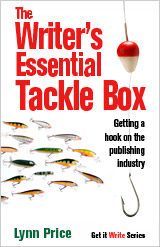Lynn Price is the editorial director of Behler Publications, a successful boutique publisher. She is one of the most knowledgeable people that I know in the business and is passionate about the ethics of the publishing industry. Her book, The Writer’s Essential Tackle Box: Getting a Hook on the Publishing Industry, is a must-read for all writers, whether wanna-be or published. All publishers are not created equal, as you will learn from her eye-opening post.
I was doing a seminar on publishing and the things authors should look for when vetting a potential publisher, when a couple very weary authors raised their hands to share their experiences. What happened to them is what I call the Dirtbaggery of Publishing. These are the guys who promise the moon (Distribution! Print Runs! Promotion! Sales!) and manage to renege on all of these promises, leaving the authors bereft and cynical. And I don’t blame them. So it’s a good idea to know some of the red flags in order to save yourself from suffering these authors’ fates.
It’s All About the Money, Baby
Publishing is expensive. Very expensive. So this should be your first clue. An underfunded publisher isn’t in the position to shoulder much risk, so they need to take shortcuts—which always ends up adversely affecting the author. How can you tell when someone is underfunded?
They’re New: Now, new doesn’t mean they’re dirtbags, but one should be very mindful about signing with a new publisher because the chances are high they’ll be out of business in a couple years…the length of time it takes for A) their business plan to fail, or B) run out of investment money. Best to give new companies a couple years so you can gauge their sales and author satisfaction.
E-publishers: Doesn’t seem fair to target e-publishers, but the beauty of this particular business plan means even smaller working capital.
Websites: Their websites will be geared toward writers, not readers. The idea is to have a website where readers, including store owners, librarians, and media may refer to when interested in a particular book. It’s not meant to be a Help Wanted ad.
Business Plan: What I mean by business plan is how the company operates. Something that I’ve been seeing almost exclusively among e-publishers is that they don’t pay their production staff (that includes editors, cover designers, formatters,  etc.) for the work they do on each book. Instead, they pay them based on sales. Let me say that again. THEY PAY ON SALES.
etc.) for the work they do on each book. Instead, they pay them based on sales. Let me say that again. THEY PAY ON SALES.
If a book tanks, the production staff doesn’t get paid. This is outrageous because, not only is the lack of sales NOT the production staff’s fault, but the publisher is forcing their own staff to shoulder all the risk, while the publisher gets off free as you please.
This is dirtbaggery of the highest order because this business plan creates a domino effect. If you don’t pay your production staff an actual salary, you aren’t going to attract a quality, experienced staff. I don’t know of any experienced publishing experts who are willing to risk hours and hours of hard work per title on the hope that the books sell enough units in order to squeak out a paycheck.
So, in a word, this affects editing. If you’re lucky enough to bump into a good editor, then yeehaw, you struck gold. But what if you don’t? The end result is that publisher has uneven editing—some good, some sucky. Are you willing to play Russian Roulette with your manuscript?
Follow. The. Money.
It’s a Numbers Game. Dirtbag publishers operate on a numbers game. They need a lot of new titles coming out each week in hopes that some of them sell. What happens to those that don’t sell? Well, nothing. It’s promptly forgotten as an “oh well,” and they move on to another book. Let’s not forget that not only did you, the author, suck it, but so did all the production people because they didn’t get paid.
The Numbers Game is like holding a handful of darts, and tossing them all at the same time, hoping one hits the bull’s eye. The law of averages isn’t in your favor. And because publishers who employ The Numbers Game experience more tanked books than successful sales, they need to maintain that high release count to offset the no-sellers.
The added problem with The Numbers Game is that they can’t possibly promote all  their books. I don’t care what they tell you, it’s physically impossible. They would have to hire marketing people, and that costs money. These guys are low risk, high numbers, and they will steamroll over any book that doesn’t perform.
their books. I don’t care what they tell you, it’s physically impossible. They would have to hire marketing people, and that costs money. These guys are low risk, high numbers, and they will steamroll over any book that doesn’t perform.
Promotion. So if they don’t promote, then who does? Um. You do. You become the unpaid sales force for your publisher…which is a load of bantha fodder. It’s lovely when authors promote their books because, frankly, it’s an important component to supporting the publisher’s promotion/marketing strategy. Read my fingers…the publisher’s promotion/marketing strategy.
But keep in mind that your publisher MUST support your efforts. I’ve heard horror stories about authors arriving to a book signing only to find there were no books because the publisher didn’t have the money to print them.
It’s your publisher’s job to market and promote your book. They should be sending media kits to reviewers and the print/radio/TV media in order to alert them about your fabulous book. Their job is at the national level; your job is at the local level. E-publishers should be advertising your books in genre magazines, alerting reviewer blogs, planning blog tours, and tweeting.
Distribution. This is a hot button issue because there’s so much confusion surrounding it. If your editor tells you that oh yes, they have full distribution through Ingram and Baker & Taylor, then you are NOT distributed. Ingram and B&T are warehouse distributors who fulfill orders placed by bookstores. They don’t have sales teams whose jobs consist of pushing your publisher’s catalog. All this means is that your title is in their databases, where stores could place an order.
Publishers with national distribution have exclusive agreements with book distribution companies, like Consortium, IPG, and Perseus. Thar be a huge difference. Without real distribution through these channels, it’s nearly impossible to get store placement.
In short, if your publisher is low on cash, lacks distribution, and no means of active promotion, then this isn’t the publisher who can do the very best for your book. You don’t bring a peashooter to a war, and you don’t bring a Dirtbag to your manuscript. Protect yourself and enjoy the rewards.


Thanks for the profile, Mike. You need to fix the link to Behler Publications website though. And you an editor…Bill
Aha, caught me. It’s fixed now. And glad you survived the fire!
It was through reading Lynn’s book that I came to meet Mike, which is a wonderful thing for which I will be eternally grateful.
But damn…reading this sort of truth is depressing!
If nothing else, it reinforces the advice to write because you love it and can’t possibly make yourself quit, no matter what. Anything else is gravy that is becoming harder and harder to find in this publishing climate.
You’re right, Kate, the truth about this business is definitely depressing. But as the overused cliché goes, it is what it is. I’m happy writing something that just entertains ME! 🙂